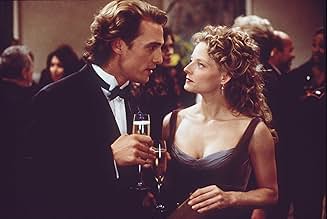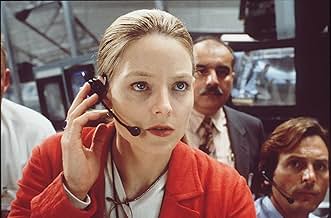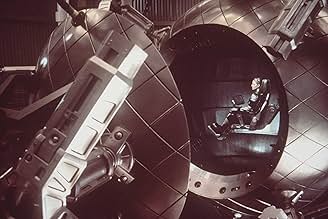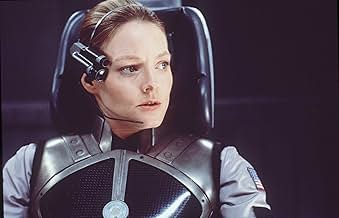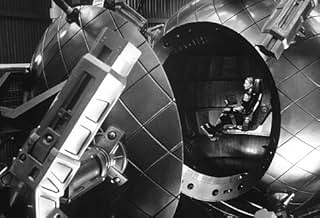Dr. Ellie Arroway (Jodie Foster) findet nach jahrelanger Suche einen schlüssigen Funknachweis für außerirdische Intelligenz und sendet Pläne für eine mysteriöse Maschine.Dr. Ellie Arroway (Jodie Foster) findet nach jahrelanger Suche einen schlüssigen Funknachweis für außerirdische Intelligenz und sendet Pläne für eine mysteriöse Maschine.Dr. Ellie Arroway (Jodie Foster) findet nach jahrelanger Suche einen schlüssigen Funknachweis für außerirdische Intelligenz und sendet Pläne für eine mysteriöse Maschine.
- Für 1 Oscar nominiert
- 14 Gewinne & 32 Nominierungen insgesamt
Sami Chester
- Vernon
- (as SaMi Chester)
Max Martini
- Willie
- (as Maximilian Martini)
Empfohlene Bewertungen
This remains true for this very good adaptation of the classic book by Carl Sagan. Sagans' idea was to make science and the elite commandeering of information available to the majority, he wrote his books for a wide audience and I think the film shows this as was intended by its author.
The Film is roughly about Dr Arroway, Ellie, and how she handles being alone in a world without family or close friends. It is metaphorically able to make us all think about how isolated we as a race, and as people can feel.
Ellie, a brilliant young scientist working on the mistrusted SETI program discovers a message sent to earth from distant star system Vega. On its discovery Ellie must battle with the Military, Pentagon, and Male Dominated scientific world to keep her cards on the table and her discovery that of her team. Ellie is constantly kept in the game by he benefactor, a rich technological industrialist mogul who has a vested interest in her participation of the programme to reach this alien culture.
I don't wish to go on any further and spoil this movie as I rate it as a fantastic exploration of Science Vs Religion and the entire subsequent human spectrum in between. As a film there were several alterations from the book that I felt could have been included, for example not just one traveler but a range of them, philosophers, theologists, scientists, poets and Dr Arroway.
I have watched this film a number of times and still find it a joy to watch the fifth, eighth and tenth time. Jody foster playing a not so dissimilar to her role in Silence of the lambs (attractive, clever, young, successful woman battling in a male world) is exceptional and delivers feeling and intellect alongside an impressive script.
I would give this film an 8.5 and recommend it to anybody, but if you are a sci-fi fan and haven't seen this film then you're in for a treat.
The Film is roughly about Dr Arroway, Ellie, and how she handles being alone in a world without family or close friends. It is metaphorically able to make us all think about how isolated we as a race, and as people can feel.
Ellie, a brilliant young scientist working on the mistrusted SETI program discovers a message sent to earth from distant star system Vega. On its discovery Ellie must battle with the Military, Pentagon, and Male Dominated scientific world to keep her cards on the table and her discovery that of her team. Ellie is constantly kept in the game by he benefactor, a rich technological industrialist mogul who has a vested interest in her participation of the programme to reach this alien culture.
I don't wish to go on any further and spoil this movie as I rate it as a fantastic exploration of Science Vs Religion and the entire subsequent human spectrum in between. As a film there were several alterations from the book that I felt could have been included, for example not just one traveler but a range of them, philosophers, theologists, scientists, poets and Dr Arroway.
I have watched this film a number of times and still find it a joy to watch the fifth, eighth and tenth time. Jody foster playing a not so dissimilar to her role in Silence of the lambs (attractive, clever, young, successful woman battling in a male world) is exceptional and delivers feeling and intellect alongside an impressive script.
I would give this film an 8.5 and recommend it to anybody, but if you are a sci-fi fan and haven't seen this film then you're in for a treat.
The 90's movies have a certain charm you can not replicate. It makes you belive in better things, makes you want to be better. I liket this movie because it focused on mankind, and not just America. Do not take me wrong. I dont have any problem with America, but there are a lot of things you have to consider besides that nation. I liked the how it made me think about the everlasting parallel between belief and technology. It gives you the right to choose, what you want to belive in. That is a very nice thing nowadays.
N.B: This is a very long monologue because I adore CONTACT to bits.
I loved the irony present in Contact, as well as its religious imagery and its attention to fine detail. To see the universe in that opening scene was breath-taking, and the reason for it all coming out of Ellie's eye becomes blissfully apparent in light of the end, for her journey was just as much a physical as well as an emotional and spiritual one. The photography was superb, alternating between expansive sweeps of the landscape and the universe, and close, intimate shots of the characters, symbolising the potential for the unknown' as well as an equally important knowledge of all that is familiar contact with our own people.
The irony manifested itself in how Ellie, who denounced Palmer's ability to possess complete faith in God, ended up being the advocate of such a faith, though of a different strand; she could now appreciate Palmer's passion. Remember that Biblical verse that when paraphrased reads something like: `The man who is not willing to give up his life will lose it, but he who is willing will gain it'? This religious imagery correlates to how Drumlin lost his life in pursuit of personal acclaim, while Ellie, who admitted that she would freely give up her life in pursuit of life's tormenting questions, gained it in such a memorable and satisfying way. She found inner peace, having made contact with two intelligent races; one of the skies, and one of her own kind. The dried up cliché alluding to aliens: `We are not alone' begins to take on a new meaning in a multitude of dimensions in light of this brilliant movie.
I read this wonderful blurb' about Contact, and I think this following line delineates the film, and why watching Contact became such a defining film for me: `[Ellie's] personal voyage will take her beyond theory, beyond knowledge , beyond experience, to the realization that true vision is ultimately the union of fact and faith.' This duality of life and true fulfilment which arises from the reconcilement of contrary beliefs is surely a theme of the film: evinced through the conflict created by science vs. religion, fact vs. faith, vision vs. reality.
Carl Sagan's novel was also a fulfilling pleasure to read. I thought that the message in pi was an absolutely crucial element of the book, the implications of such a message being that there is an all-powerful force' behind the universe, which brings order to disorder, and such a force' we might call God. So possibly, C.S's novel did prove the existence of God. Maybe the recurring C' pattern in the film, (the quadruple' system Ellie saw near Vega, the sands in her father's hands and that which she holds in the end), is indicative of such order that no matter how large or small an event, i.e, whether a message is written in the sky or in the palm of one's hands, order is present, and implies a powerful force guiding the universe.
I am incapable of seeing many, if any, faults with this film I truly cannot understand why anyone would think it contrived or the same as something as brain-numbing and gung-ho as `Armageddon'. It is truly an intellectual film with meanings at many levels and so thought-provoking! Perhaps Matthew McConaughey's representation of Palmer Joss was a little unbelievable, and the thrice-repeated `It's an awful waste of space' phrase that connected Ellie to her father and Ellie to Palmer can be seen as a tad too sentimental on the one hand, but on the other, it serves to punctuate the potentiality of the physical universe, and the human mind, which, in C.S's case, conceived this book. Jodie Foster is magnificent, but then again, isn't she always? The extraordinary passion Ellie exhibited was admirable her innate sense of wonder balanced by a stabbing loneliness, born out of the premature departure of a dear parent.
I love Contact because of its poignant humanity, the sense of wonder that resonates so strongly throughout the film and indicates the strength of that wonder which inspired C.S in the first place, and because it searches for meaning so idealistically, while still, necessarily, maintaining the sometimes harsh realities of life (personified by James Woods' unsympathetic and skeptical Kitz).
To those who hated the ending, you obviously missed a crucial component of the film, that of possibility and potentiality. To have Ellie return with tangible evidence of alien existence would demolish all the credibility that Robert Zemeckis attempted to create by showing the current American president referring generically to the event of the message being discovered, the decision to build the machine, etc. The ending was crafted in such a way as to enable a choice by the viewer/reader to be made just like how C.S equally respected those in his book who chose to pursue a path of science or religion. We, the audience, are allowed to decide what really happened, and this makes Contact an almost interactive and therefore a more intimate experience.
Contact has something to say to everyone, and has real meaning that cannot help but whisk viewers and readers alike to some thrilling place. To those who thought the film predictable, and had not previously read the book, I would say that you must be VERY creative if you managed to anticipate all that Contact had to offer. But for everyone who was as much inspired by this magnificent film as I was, here's the most important lesson to be derived from both the book and the film: `For small creatures such as we the vastness is bearable only through love.' This enlightened message, dreamt up by Carl Sagan, makes me even more convinced that a book critic who said of Carl Sagan: `with terrestrials like him, who needs extras?' is exactly right.
I loved the irony present in Contact, as well as its religious imagery and its attention to fine detail. To see the universe in that opening scene was breath-taking, and the reason for it all coming out of Ellie's eye becomes blissfully apparent in light of the end, for her journey was just as much a physical as well as an emotional and spiritual one. The photography was superb, alternating between expansive sweeps of the landscape and the universe, and close, intimate shots of the characters, symbolising the potential for the unknown' as well as an equally important knowledge of all that is familiar contact with our own people.
The irony manifested itself in how Ellie, who denounced Palmer's ability to possess complete faith in God, ended up being the advocate of such a faith, though of a different strand; she could now appreciate Palmer's passion. Remember that Biblical verse that when paraphrased reads something like: `The man who is not willing to give up his life will lose it, but he who is willing will gain it'? This religious imagery correlates to how Drumlin lost his life in pursuit of personal acclaim, while Ellie, who admitted that she would freely give up her life in pursuit of life's tormenting questions, gained it in such a memorable and satisfying way. She found inner peace, having made contact with two intelligent races; one of the skies, and one of her own kind. The dried up cliché alluding to aliens: `We are not alone' begins to take on a new meaning in a multitude of dimensions in light of this brilliant movie.
I read this wonderful blurb' about Contact, and I think this following line delineates the film, and why watching Contact became such a defining film for me: `[Ellie's] personal voyage will take her beyond theory, beyond knowledge , beyond experience, to the realization that true vision is ultimately the union of fact and faith.' This duality of life and true fulfilment which arises from the reconcilement of contrary beliefs is surely a theme of the film: evinced through the conflict created by science vs. religion, fact vs. faith, vision vs. reality.
Carl Sagan's novel was also a fulfilling pleasure to read. I thought that the message in pi was an absolutely crucial element of the book, the implications of such a message being that there is an all-powerful force' behind the universe, which brings order to disorder, and such a force' we might call God. So possibly, C.S's novel did prove the existence of God. Maybe the recurring C' pattern in the film, (the quadruple' system Ellie saw near Vega, the sands in her father's hands and that which she holds in the end), is indicative of such order that no matter how large or small an event, i.e, whether a message is written in the sky or in the palm of one's hands, order is present, and implies a powerful force guiding the universe.
I am incapable of seeing many, if any, faults with this film I truly cannot understand why anyone would think it contrived or the same as something as brain-numbing and gung-ho as `Armageddon'. It is truly an intellectual film with meanings at many levels and so thought-provoking! Perhaps Matthew McConaughey's representation of Palmer Joss was a little unbelievable, and the thrice-repeated `It's an awful waste of space' phrase that connected Ellie to her father and Ellie to Palmer can be seen as a tad too sentimental on the one hand, but on the other, it serves to punctuate the potentiality of the physical universe, and the human mind, which, in C.S's case, conceived this book. Jodie Foster is magnificent, but then again, isn't she always? The extraordinary passion Ellie exhibited was admirable her innate sense of wonder balanced by a stabbing loneliness, born out of the premature departure of a dear parent.
I love Contact because of its poignant humanity, the sense of wonder that resonates so strongly throughout the film and indicates the strength of that wonder which inspired C.S in the first place, and because it searches for meaning so idealistically, while still, necessarily, maintaining the sometimes harsh realities of life (personified by James Woods' unsympathetic and skeptical Kitz).
To those who hated the ending, you obviously missed a crucial component of the film, that of possibility and potentiality. To have Ellie return with tangible evidence of alien existence would demolish all the credibility that Robert Zemeckis attempted to create by showing the current American president referring generically to the event of the message being discovered, the decision to build the machine, etc. The ending was crafted in such a way as to enable a choice by the viewer/reader to be made just like how C.S equally respected those in his book who chose to pursue a path of science or religion. We, the audience, are allowed to decide what really happened, and this makes Contact an almost interactive and therefore a more intimate experience.
Contact has something to say to everyone, and has real meaning that cannot help but whisk viewers and readers alike to some thrilling place. To those who thought the film predictable, and had not previously read the book, I would say that you must be VERY creative if you managed to anticipate all that Contact had to offer. But for everyone who was as much inspired by this magnificent film as I was, here's the most important lesson to be derived from both the book and the film: `For small creatures such as we the vastness is bearable only through love.' This enlightened message, dreamt up by Carl Sagan, makes me even more convinced that a book critic who said of Carl Sagan: `with terrestrials like him, who needs extras?' is exactly right.
Although Jodie Foster has won two Oscars in her career I think her best work was done in Contact, a film where the only recognition it received was a nomination for Best Sound. She also never did a more serious film about a more serious topic. Are we in fact the only life there is in this vast universe and how do we find out.
As a scientist, something she wanted to be all her life, Foster is determined to get answers in the best way she knows, build the biggest radio telescope there is and throw out a few signals. Someone out in the great beyond will answer. Foster gets an answer.
What I love about Contact is that the gamut of human reactions to the possibility of life is dealt with in this film. It ranges from the multi-billionaire who wants his own life extended John Hurt, the geopolitician who is interested in power James Woods, the sincerely religious men of faith who want to see how God fits into the scheme of things Matthew McConaughey, and even the religious terrorist who fears that a mountain of man made dogma that he's based his life on will be washed away Jake Busey. Busey's part is extremely relevant, we have way too many of those in the world and strategically placed they can cause catastrophe.
Foster gets a blueprint for a space time travel machine, warp drive the likes of which James T. Kirk only wished he had. It goes horribly wrong the first time, Foster takes it herself for a second try.
Mention should also go to David Morse who plays Foster's father, first in scenes with young Jena Malone who was a science prodigy as a kid and later Foster during her 'journey' gets to talk to Morse again. Was it real or a hallucination. His scenes are the highlight of the film for me.
Contact takes no sides in the end, it simply takes the position that in terms of the universe humankind is taking baby steps. If we are really the only life in the universe it seems like an awful waste of space.
The special effects are fine, the sound was considered Academy worthy. So much more of Contact is, most especially the performances of Jodie Foster and her supporting cast.
As a scientist, something she wanted to be all her life, Foster is determined to get answers in the best way she knows, build the biggest radio telescope there is and throw out a few signals. Someone out in the great beyond will answer. Foster gets an answer.
What I love about Contact is that the gamut of human reactions to the possibility of life is dealt with in this film. It ranges from the multi-billionaire who wants his own life extended John Hurt, the geopolitician who is interested in power James Woods, the sincerely religious men of faith who want to see how God fits into the scheme of things Matthew McConaughey, and even the religious terrorist who fears that a mountain of man made dogma that he's based his life on will be washed away Jake Busey. Busey's part is extremely relevant, we have way too many of those in the world and strategically placed they can cause catastrophe.
Foster gets a blueprint for a space time travel machine, warp drive the likes of which James T. Kirk only wished he had. It goes horribly wrong the first time, Foster takes it herself for a second try.
Mention should also go to David Morse who plays Foster's father, first in scenes with young Jena Malone who was a science prodigy as a kid and later Foster during her 'journey' gets to talk to Morse again. Was it real or a hallucination. His scenes are the highlight of the film for me.
Contact takes no sides in the end, it simply takes the position that in terms of the universe humankind is taking baby steps. If we are really the only life in the universe it seems like an awful waste of space.
The special effects are fine, the sound was considered Academy worthy. So much more of Contact is, most especially the performances of Jodie Foster and her supporting cast.
Reading other peoples' reviews, I see a split 50/50 argument where one side loves the movie and the other hates it. I am not one bit surprised, due to the importance of the film, and I feel this is proof that Contact is one of the most powerful movies of the decade. Like the reaction from the civilians to the machine, a movie with this much heavy firepower is likely to get both loathing and praise from its viewers. I for one praise the film, for its toughness and sensitivity, symbolism and passion, and the fact that it is a rare science fiction film, a gem which was released in a time where scientific intelligence in film has become a nothing short of a joke as the wonder of the universe has been ignored and the mystery of alien life have become a neverending trail of movie villains.
The film of course centers around the science vs. religion theme, the oldest and most frightening of all school debates. Instead of taking the more independent path the book takes, the film takes the more sensitive on the science vs. religion argument throughout the film by telling us that science and religion points to the same direction (the "pursuit of truth") but are misunderstood when studying the nature of their WAY of finding the truth (science uses evidence and answers, religion uses love faith). At the end of it all, the film lets us know that if science and religion stops colliding with each other and starts to combine and compliment each other (listen to Ellie's final words in her testament) the human race might achieve things we can only dream about now.
A perfectly refreshing film, with lots to say, great acting and directing, sound and special effects. Robbed by the Academy.
The film of course centers around the science vs. religion theme, the oldest and most frightening of all school debates. Instead of taking the more independent path the book takes, the film takes the more sensitive on the science vs. religion argument throughout the film by telling us that science and religion points to the same direction (the "pursuit of truth") but are misunderstood when studying the nature of their WAY of finding the truth (science uses evidence and answers, religion uses love faith). At the end of it all, the film lets us know that if science and religion stops colliding with each other and starts to combine and compliment each other (listen to Ellie's final words in her testament) the human race might achieve things we can only dream about now.
A perfectly refreshing film, with lots to say, great acting and directing, sound and special effects. Robbed by the Academy.
Wusstest du schon
- WissenswertesAuthor and producer Carl Sagan died during production. He was reportedly taking great care to ensure that science was accurately depicted in this movie.
- PatzerWalkie-talkies and cell phones are not allowed near a radio telescope array. They would overpower the array, making it useless.
- Crazy Credits"For Carl"
- VerbindungenEdited into Zaum - Andare a parare: Lo spazio dell'orbita (2011)
- SoundtracksWho Needs Wings to Fly
Written by Dominic Frontiere and Sid Wayne
Top-Auswahl
Melde dich zum Bewerten an und greife auf die Watchlist für personalisierte Empfehlungen zu.
Details
- Erscheinungsdatum
- Herkunftsland
- Offizielle Standorte
- Sprachen
- Auch bekannt als
- Contacto
- Drehorte
- Arecibo Observatory, Arecibo, Puerto Rico(large radio telescope)
- Produktionsfirmen
- Weitere beteiligte Unternehmen bei IMDbPro anzeigen
Box Office
- Budget
- 90.000.000 $ (geschätzt)
- Bruttoertrag in den USA und Kanada
- 100.920.329 $
- Eröffnungswochenende in den USA und in Kanada
- 20.584.908 $
- 13. Juli 1997
- Weltweiter Bruttoertrag
- 171.120.329 $
- Laufzeit2 Stunden 30 Minuten
- Farbe
- Sound-Mix
- Seitenverhältnis
- 2.39 : 1
Zu dieser Seite beitragen
Bearbeitung vorschlagen oder fehlenden Inhalt hinzufügen




